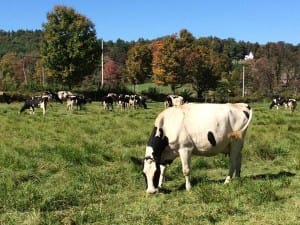[Jim Gerritsen is a member of Cornucopia’s Policy Advisory Panel.]
Brownfield Ag News
by Bob Meyer
 |
The Organic Trade Association has petitioned USDA to create a national organic checkoff. OTA CEO Laura Batcha says the petition is the culmination of a three-year process. Batcha says the funds are needed to educate consumers about organics, fund research and development of new products and recruit and train new organic farmers. As it stands, organic demand is constantly outpacing organic production so some question the need for promotion; Batcha says this program is designed to increase the perception of the value of organic products by the consumer. A unique aspect of the proposal is that it is across-the-industry rather than just one commodity as with other checkoff programs. It would be administered by a board with half of the members elected by organic farmers and half from the handlers and processors. There would be seven farmers representing seven geographic regions and one farmer representing producers with annual gross revenues under $250,000. Participation in the checkoff would be voluntary for those smaller producers.
Jim Gerritsen is an organic farmer in Maine and serves as president of the Organic Seed Growers and Trade Association. The membership of OSGATA have unanimously voted to oppose the checkoff. Gerritsen says a number of their members participate in other checkoffs “and it does not inspire confidence.” The members think checkoffs favor larger farmers and operations and there is no reason to believe this one would be any different. He says the vast majority of organic farmers are smaller operations and would not benefit from the assessment.
Gerritsen says the group also has a problem with the proposed 50-50 makeup of the checkoff board because there are many more organic producers than organic handlers. He thinks there should be a “dedicated number of board members who truly represent family farmers.” Gerritsen also thinks the research funding in the proposal should be assessed according to how much someone is making on a product. He contends the processors make a lot more money than the producers do and the assessment should be proportionate to that. He says his group will work to educate more farmers about the proposal if USDA decides to move forward with it.
Batcha says while there are more organic producers than handlers and processors holding organic certificates. “But the projections show that 80 to 85 percent of the dollars going into the program will come from the handlers.”
USDA has called for any other proposals, after that, should they decide to move forward they will issue a preliminary proposal followed by a public comment period. Those comments would then be considered in the creation of a final rule. All organic certificate holders would then vote on that final rule. Batcha expects the whole process will take around 18 months to complete.
Go to Brownfield News and scroll to the end of the article to listen to audio clips of Laura Batcha talking about the proposal and Jim Gerritsen talking about his opposition to the proposal.

